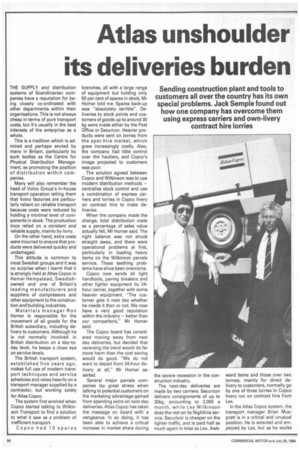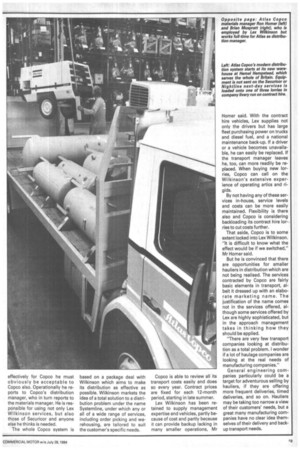Atlas unshoulder its deliveries burden
Page 60

Page 61

If you've noticed an error in this article please click here to report it so we can fix it.
THE SUPPLY and distribution systems of Scandinavian cornpanies have a reputation for being closely co-ordinated with other departments within their organisations. This is not always cheap in terms of pure transport costs, but its usually in the best interests of the enterprise as a whole.
This is a tradition which is admired and perhaps envied by many in Britain, particularly by such bodies as the Centre for Physical Distribution Management, as promoting the position of distribution within companies.
Many will also remember the head of Volvo Group's in-house transport operation telling them that Volvo factories are particularly reliant on reliable transport because costs were reduced by holding a minimal level of components in stock. The production lines relied on a constant and reliable supply, mainly by lorry.
On the other hand, extra costs were incurred to ensure that products were delivered quickly and undamaged.
This attitude is common to most Swedish groups and it was no surprise when I learnt that it is strongly held at Atlas Copco in Hemel Hempstead, Swedishowned and one of Britain's leading manufacturers and suppliers of compressors and other equipment to the construction and building industries.
Materials manager Ron Homer is responsible for the movement of all goods for the British subsidiary, including deliver), to customers. Although he is not normally involved in British distribution on a day-today level, he keeps a close eye on service levels.
The British transport system, established five years ago, makes full use of modern transport techniques and service schedules and relies heavily on a transport manager supplied by a contractor, but working solely for Atlas Copco.
The system first evolved when Copco started talking to Wilkinson Transport to find a solution to what it saw as a problem of inefficient transport.
Copco had 10 spares branches, all with a large range of equipment but holding only 50 per cent of spares in stock, Mr Homer told me. Spares back-up was "absolutely terrible". Deliveries to stock points and customers of goods up to around 30 kg were made either by the Post Office or Securicor. Heavier products were sent on lorries from the spot-hire market, which grew increasingly costly. Also, the company had little control over the hauliers, and Copcors image projected to customers was poor.
The solution agreed between Copco and Wilkinson was to use modern distribution methods — centralise stock control and use a combination of express carriers and lorries in Copco livery on contract hire to make deliveries.
When the company made the change, total distribution costs as a percentage of sales value actually fell, Mr Homer said. The right balance was not struck straight away, and there were operational problems at first, particularly in loading heavy items on the Wilkinson parcels service. These teething problems have since been overcome.
Copco now sends all light handtools, paving breakers and other lighter equipment by 24hour carrier, together with some heavier equipment. "The customer gets it next day whether he needs it then or not. We now have a very good reputation within the industry — better than our competitors," Mr Homer said.
The Copco board has considered moving away from next day deliveries, but decided that reversing the trend would do far more harm than the cost saving would do good. "We do not want to depart from 24-hour delivery at all," Mr Homer asserted.
Several major parcels companies lay great stress when talking to potential customers on the marketing advantage gained from spending extra on next-day deliveries. Atlas Copco has taken the message on board with a vengeance. In so doing, it has been able to achieve a critical increase in market share during the severe recession in the construction industry.
The next-day deliveries are made by two carriers. Securicor delivers consignments of up to 30kg, amounting to 2,000 a month, while Lex Wilkinson does the rest on its Nig htlin e service. Securicor is cheaper on the lighter traffic, and is paid half as much again in total as Lex. Awk ward items and those over two tonnes, mainly for direct delivery to customers, normally go by one of three lorries in Copco livery run on contract hire from Lex.
In the Atlas Copco system, the transport manager Brian Muspratt is in a critical and unusual position. lie is selected and employed by Lex, but as he works effectively for Copco he must obviously be acceptable to Copco also. Operationally he reports to Copco's distribution manager, who in turn reports to the materials manager. He is responsible for using not only Lex Wilkinson services, but also those of Securicor and anyone else he thinks is needed.
The whole Copco system is based on a package deal with Wilkinson which aims to make its distribution as effective as possible. Wilkinson markets the idea of a total solution to a distribution problem under the name Systemline, under which any or all of a wide range of services, including order picking and warehousing, are tailored to suit the customer's specific needs. Copco is able to review all its transport costs easily and does so every year. Contract prices are fixed for each 12-month period, starting in late summer.
Lex Wilkinson has been retained to supply management expertise and vehicles, partly because of cost and partly because it can provide backup lacking in many smaller operations, Mr Homer said. With the contract hire vehicles, Lex supplies not only the drivers but has large fleet purchasing power on trucks and diesel fuel, and a national maintenance back-up. If a driver or a vehicle becomes unavailable, he can easily be replaced. If the transport manager leaves he, too, can more readily be replaced. When buying new lorries, Copco can call on the Wilkinson's extensive experience of operating artics and rigids.
By not having any of these services in-house, service levels and costs can be more easily maintained. Flexibility is there also and Copco is considering backloading its contract hire lor. ries to cut costs further.
That aside, Copco is to some extent locked into Lex Wilkinson. "It is difficult to know what the effect would be if we switched," Mr Homer said.
But he is convinced that there are opportunities for smaller hauliers in distribution which are not being realised. The services contracted by Copco are fairly basic elements in transport, albeit it dressed up with an elaborate marketing name. The justification of the name comes not in the services offered, although some services offered by Lex are highly sophisticated, but in the approach management takes in thinking how they should be applied.
"There are very few transport companies looking at distribution as a total problem. I wonder if a lot of haulage companies are looking at the real needs of manufacturing companies."
General engineering companies particularly could be a target for adventurous selling by hauliers, if they are offering more frequent deliveries, timed deliveries, and so on. Hauliers may be taking too narrow a view of their customers' needs, but a great many manufacturing companies have no clear idea themselves of their delivery and backup transport needs.




























































































